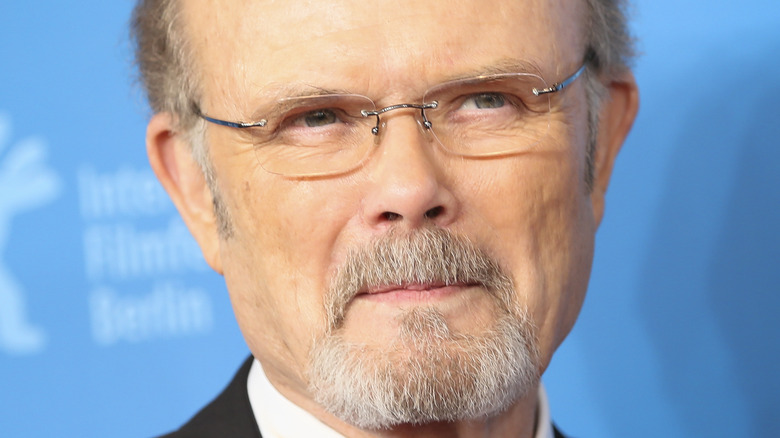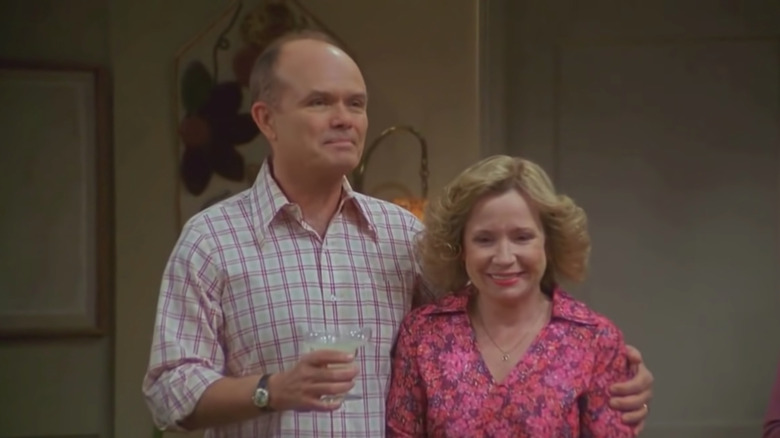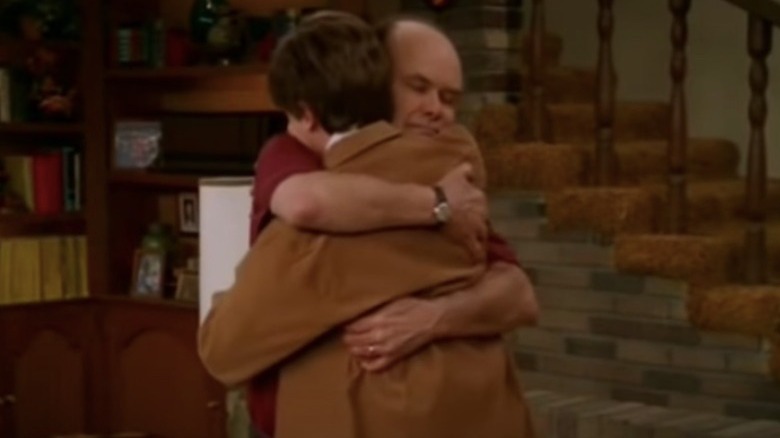That '70s Show Owes Quite A Bit To Kurtwood Smith's Stepdad
One reason "That '70s Show" was so successful throughout its eight-season run from 1998 to 2006 was nostalgia. You didn't have to live through the decade to appreciate the period fashions and frequent references to the music of the day, like when Eric Forman (Topher Grace) had tickets to Styx on Thanksgiving in Season 7, Episode 9, "You Can't Always Get What You Want."
But the '70s stylings are mere background and image for the true stars of the show — well-drawn characters who make us laugh and, sometimes, kind of remind us of people we know. Can't we all think of someone in real life who's as earnest as Eric, as ditzy as Michael Kelso (Ashton Kutcher), or as image-conscious and superficial as Jackie Burkhart (Mila Kunis)?
Eric's father Red Forman (Kurtwood Smith) is one of those oh-so-familiar characters, too, a standout for his tough-as-nails attitude toward everyone around him. And it makes you wonder: Did the actor who played him take inspiration from someone he really knew?
Kurtwood Smith found an angle that hit close to home
Kurtwood Smith had been acting professionally for decades before he landed the role of the patriarch on "That '70s Show." Much of his work was in theatre, with small parts in television shows like "The A-Team" in 1984 and "Newhart" in 1986, until he landed the role of crime boss Clarence Boddicker in the 1987 blockbuster "RoboCop." After that, his film work picked up, with roles in 1989's "Dead Poets Society," 1991's "Shadows and Fog," and 1996's "Citizen Ruth" (via IMDb).
It was this body of work that led him to audition for the role of Red Forman on "That '70s Show," a part nearly scooped up by martial artist and actor Chuck Norris. Right from the start, Smith felt he knew the character, a hard-edged war veteran with little patience for anyone who annoyed him — and most people did. There was something familiar about the way Red moved through the world, schooling those around him about how they ought to behave, dishing out large doses of sarcasm, and frequently dressing down his son as a "dumbass." The character reminded Smith of someone in his own life, and he ran with it in his quest to win the role.
"I did not write any of those jokes, but when I first auditioned for the role and from then on, I always had my stepdad in mind," Smith told The AV Club. And while it may not have been easy growing up with a father like Red Forman, he said his work on the show was always a pleasure.
The real Red Forman never saw the show
Chuck Norris may have had a shot at the role initially, but a scheduling conflict prevented him from pursuing it. As fans know, Kurtwood Smith went on to play Red for eight seasons on the show, taking his character on a journey that eventually led to his opening up about actual feelings to his son in Season 7, Episode 25, "'Til the Next Good-bye." Eric comes down the stairs, ready to leave for Africa, and Red offers him his precious pocket knife from Korea, which he's never allowed his son to touch. "And son, I want you to know that I'm gonna miss you and I love you and have a good trip," he says, uncharacteristically, prompting Eric to reply, "Wait a second. What did you just say?" Red doesn't repeat himself. "You heard me," he says, and they hug. Just like, as Eric puts it, "Normal people."
But none of this means Red has changed for good. "You lose that knife, don't come home," he tells Eric at the end of the scene. Red remained who he was throughout the show, and Smith said he kept his character true by linking him to his stepfather "in terms of his attitude, his voice, the walk and the edge that he had" (via The Los Angeles Times).
The last thing you want to do is tick off Red Forman, though. So how did Smith dare to portray his own stepfather on the show — and how did the original Red react? Unfortunately, he died before the pilot aired and never saw Smith's portrayal. If he had, however, Smith doesn't believe it would have been a problem. His likely reaction, according to Smith: "He would have probably said, 'What the hell? I'm not like that at all.'"


